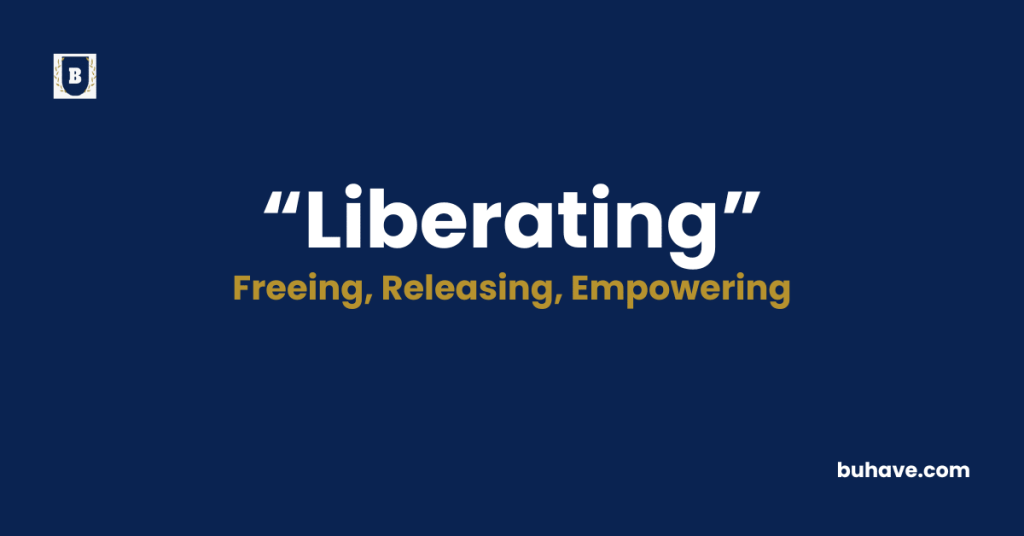The word ‘Liberating’ (Verb) describes something that sets a person free from restrictions, fear, or anything that holds them back. in this guide, you’ll learn the full definition, synonyms, antonyms, etymology, and real-life examples of how to use ‘Liberating’ correctly in sentences.
Liberating Explained in Depth
A complete and detailed guide to the words Liberating including meaning, definition, examples, etymology, synonyms, and antonyms.
Meanings of Liberating
Liberating means creating a powerful feeling of freedom, release, and relief from restrictions or burdens. At first, people often use this word to describe moments when someone breaks free from control, fear, or limitations. In addition, liberating can refer to emotional or mental release, where someone finally feels able to express themselves without fear or shame. Moreover, the word suggests more than just physical freedom; it highlights a deep, refreshing sense of empowerment and lightness. Eventually, “liberating” grew into a way to describe anything — an action, decision, or experience — that gives people the chance to live more freely and fully.
Today, when someone calls something liberating, they celebrate the powerful change it brings, unlocking joy, confidence, and new possibilities.
Definition:
Liberating describes something that sets a person free from restrictions, fear, or anything that holds them back. At first, the word focused on the physical act of being freed from control or confinement. Later, people expanded its meaning to include emotional and mental freedom, where someone feels unburdened and truly themselves. In addition, liberating suggests not just escaping something negative but also gaining a sense of strength, relief, and renewed energy.
Moreover, it highlights a positive transformation that allows someone to explore new opportunities without hesitation. Ultimately, when something feels liberating, it brings a fresh sense of hope, confidence, and empowerment into a person’s life.
Etymology:
The word “liberating” comes from a long history tied closely to freedom and release. Originally, it developed from the Latin verb “liberare,” which means “to set free” or “to release.” First, “liberare” itself grew out of the Latin noun “liber,” meaning “free.” As Latin spread across Europe, different languages adapted and shaped the idea of freeing someone from control or limits. Later on, English adopted the root word “liberate” during the 15th century, bringing with it the powerful sense of breaking free from restraints. In addition, by adding the suffix “-ing,” English speakers created “liberating,” allowing it to describe both the action and the feeling of gaining freedom. Eventually, “liberating” became a word full of energy, symbolizing emotional, physical, and mental release.
Today, when people talk about something being liberating, they connect back to centuries of language that honored the spirit of freedom.
Example Sentence:
- First, she found it liberating to finally speak her mind without worrying about judgment.
- Moreover, traveling alone gave him a liberating sense of independence and self-confidence.
- Meanwhile, the students described the new creative writing class as a liberating experience.
- In addition, quitting a toxic job felt incredibly liberating and opened the door to better opportunities.
- Eventually, he realized that letting go of fear was the most liberating choice he could make.
Liberating Synonyms:
- Freeing
- Releasing
- Unshackling
- Emancipating
- Unburdening
- Delivering
- Unchaining
- Loosening
- Opening
- Empowering
Liberating Antonyms:
- Restricting
- Confined
- Oppressive
- Limiting
- Imprisoning
- Binding
- Suppressing
- Enslaving
- Constraining
- Captive
FAQs about Liberating
Sure! Here’s a general FAQ-style format about the term “Liberating”
1. What does “liberating” mean?
Liberating” refers to the act or feeling of being set free from restrictions, limitations, or control. It can apply to physical, mental, emotional, or societal constraints.
2. In what contexts is the term “liberating” commonly used?
- Personal Development: Overcoming fears or toxic habits.
- Social/Political: Gaining freedom from oppression or injustice.
- Spiritual: Letting go of ego or finding inner peace.
- Creative: Expressing oneself without censorship or inhibition.
3. Why do people describe certain experiences as liberating?
Because those experiences often bring a sense of relief, empowerment, or newfound freedom that breaks them away from previous burdens or constraints.
4. How can something be mentally or emotionally liberating?
- Mental or emotional liberation might involve:
- Ending toxic relationships
- Forgiving oneself or others
- Letting go of perfectionism or self-doubt
- Embracing authenticity
5. What’s the difference between freedom and liberation?
- Freedom is often a state of being (e.g., living in a free society).
- Liberation is the process or act of achieving that freedom (e.g., escaping from a restrictive situation).
6. Can liberating experiences be uncomfortable at first?
Yes. Growth often involves discomfort. Liberation can mean facing fears, changing environments, or letting go of familiar identities—but it leads to greater freedom in the long term.
7. What are some examples of liberating actions?
- Quitting a job that drains you
- Speaking your truth in a difficult conversation
- Traveling solo for the first time
- Rejecting societal norms that don’t fit you
8. How can I create more liberating moments in my life?
- Reflect on what limits you
- Take small, bold actions toward freedom
- Surround yourself with supportive people
- Practice self-awareness and self-expression

















